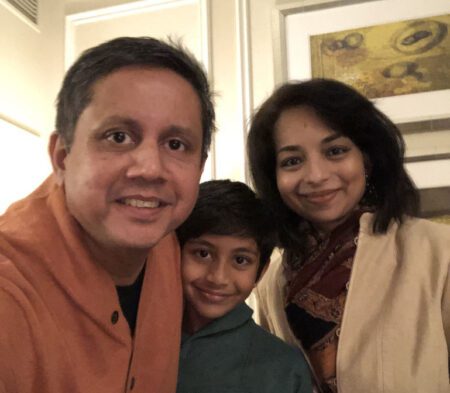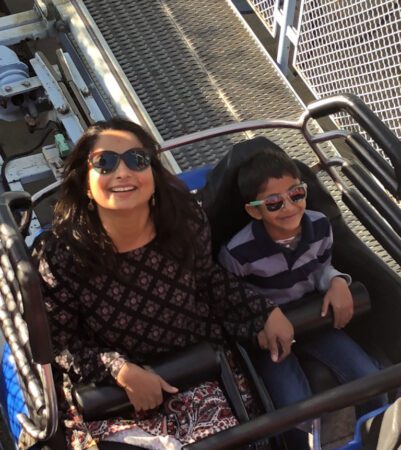At 39-years-old, Fatema Suterwala was preparing to say goodbye to her husband and young son. Confused by this cruel twist of fate and wracked with pain, she was saved by a collaboration of medical specialists and GIST experts as well as the hope and support of her husband and friends.
Fatema’s personal path led her from her family in India to university in the United States; working in NYC until she decided to return home in her mid-twenties. Diagnosed with GIST in India in 2006, her doctor performed surgery, but no follow-up treatment plan was advised. She truly thought her surgery at 25-years-old was the end of that episode of her life. The doctor had the knowledge to recognize the type of cancer Fatema had, but very little was known about GIST at the time and even less at that time in India so no adjuvant Gleevec was prescribed nor follow-up scans or testing.

Shabbir & Fatema Suterwala and their son
Fatema met her husband, Shabbir, in 2007. They were married and made their home in California. In 2010, they were blessed with a beautiful baby boy. Just a few weeks before her child’s second birthday in 2012, Fatema remembers complaining to Shabbir of stomach pains daily for a while. So began the next leg of Fatema’s journey – one that is punctuated with both confusion and seemingly random moments of divine intervention.
A relative, who was a gastrointestinal specialist, recommended that Fatema have a CT. She did and was told by the doctor evaluating the scan that she had ovarian cancer. He seemed surprised that she was unaware of this.
“They told me I needed to be in surgery immediately. You cannot waste any time, they said. You need surgery as of yesterday, they pleaded,” said Fatema.
Surgery was scheduled for the next day. Fortunately, as fate would have it, her medical team had her meet with a specialist in this cancer before the surgery. He looked at Fatema and said, “You’re too young to have ovarian cancer.” This specialist poured over her records and stated that she did not have ovarian cancer, but he believed she had GIST.
“He saved me from having unnecessary surgery. I was ready to do whatever these doctors said; ready to go under the knife, until this doctor came into my life. He said that since I already had surgery for GIST, that maybe I needed to take the medications a GIST specialist would recommend. I am so thankful for this – I cannot imagine what would have happened otherwise,” Fatema said.
Fatema and Shabbir were then on a mission to find out all they could about GIST. As they searched for a GIST specialist, her local oncologist (Dr. Dilprit Bagga) started Fatema on Gleevec. One of her tumors was about 25 cm at this point. They were able to get an appointment with GIST specialist, Dr. Bartosz Chmielowski, at UCLA. Within a few months, the treatment with Gleevec shrunk the largest tumor to about 4 cm and ultimately to 2 cm. She remained stable for a time. This treatment worked well for about three years and her team, local oncologist and GIST specialist, monitored her carefully.
“This was a blessing to have been on Gleevec and stable for all those years,” she said. Fatema and Shabbir were figuring out how to best love and support their son, who they discovered had special needs which would require extra attention.
In 2016, however, that peaceful time was interrupted when the tumors showed growth and her medical team suggested second-line treatment with Sutent (sunitinib). She stayed on Sutent from June 2016 to April 2017.
Fatema shared, “Things got really hard when I started Sutent. My legs were really hurting and I couldn’t walk. All the typical side effects with Sutent were happening to me.”
Dr. Chmielowski was doing a trial with Opdivo (nivolumab) and Keytruda (pembrolizumab), but when Fatema applied, she was rejected. The couple did not back down. They applied again and again, and in May 2017, Fatema was accepted into the trial. Before the trial, Dr. Chmielowski biopsied the tumors – exon 11, 13, and 17. She was given the Opdivo, which she did well on for about a year. Despite a good beginning with tumor shrinkage and stability, one of her tumors showed a little growth and the trial protocol considered dropping her.
Her team suggested surgery. The couple agreed, but when the surgeon went in, he was faced with the dilemma of removing part of the stomach, which would change her life radically or keeping her intact physically. The surgeon opted for no removal. The Suterwalas were disappointed because this particular tumor wasn’t responding to the immunotherapy. She was allowed to stay on the trial but after more growth was indicated at a later scan, Fatema was dropped from the trial in December 2017.
Fatema was devastated. She was already through three lines of treatment. What was the answer at this point? Fortunately, the Suterwalas were referred to Dr. Michael Heinrich at OSHU in Oregon, who was running a Phase 1 trial with DCC-2618 (ripretinib). After another round of biopsies on the tumors, she began taking that drug in January 2018. This line of treatment was abruptly ended after two weeks due to adverse reactions including a full-body rash and severe hair loss. Dr. Heinrich continued guiding Fatema in her journey.
Once again, the Suterwalas were struggling to find a solution. Stivarga (regorafenib) was yet untried, but after ten days on this drug, Fatema again had a severe allergic reaction. Fatema was at a loss to understand.
“Why was all this happening? There are hardly any cures out there, and my body isn’t accepting any of the ones that there are.”
Searching for answers Dr. Chmielowski and Dr. Arun Singh suggested trying the immunotherapy drugs she had been on before, Opdivo and Keytruda, not as a trial, but on a compassionate use basis. It was approved and Fatema took the treatment from May 2018 until August when again the scans showed there was growth.
Many months before, the Suterwalas for BLU-285 (avapritinib) which was in trial. Fatema was not eligible to participate in that trial itself. Completing the process for compassionate use took eight months of letter writing, form-filling, and legalities, involving the legal team at UCLA, which had to certify that Dr. Chmielowski would be administering and overseeing her care.
After about six months with little medication, Fatema began taking BLU-285, three pills a day. A rash developed in roughly two weeks. Though they stopped the drug immediately, the doctor didn’t believe the drug was at fault, so they lowered the dose and slowly increased with time back to three pills. Some benefit was realized, but not all the tumors were stable. Adding Sutent back into the mix was tried next. Fatema was plagued with unrelenting nausea and bloating, and required four blood transfusions within a four-month time period.
The Suterwala’s worldview changed radically around November 2018, when Dr. Chmielowski stated that Fatema should now consider palliative care. He suggested at this point that she needed to get her affairs in order.
“I heard him say those words, and all I could think was, that makes no sense. I’m not even forty-years-old. It’s not possible. I haven’t even seen my son celebrate his tenth birthday or all of the things in the future. This is it?” Fatema shared.
The next few weeks were full of physically and emotionally painful times. Well-meaning friends and acquaintances gave Fatema advice on how to prepare to die. Fatema bore it and began to record videos for her son, struggling to imagine how she would feel and what she would say to him for key events in his life such as graduation. It was a draining experience. Her husband, Shabbir, reached out to The Life Raft Group for resources on how to talk to his young son about his mother dying as he worked to keep hope alive for a solution that would save her.
 At the end of the month, Dr. Chmielowski contacted Fatema and Shabbir explaining that a doctor who had heard about her case during a virtual tumor board was moving from New York (Memorial Sloan Kettering) and was interested in meeting her and learning more. When the Suterwalas met with Dr. Brian Kadera, an oncology surgeon, and after viewing her scans he said that he was not sure he could get the tumors out, but he thought he might be able to help.
At the end of the month, Dr. Chmielowski contacted Fatema and Shabbir explaining that a doctor who had heard about her case during a virtual tumor board was moving from New York (Memorial Sloan Kettering) and was interested in meeting her and learning more. When the Suterwalas met with Dr. Brian Kadera, an oncology surgeon, and after viewing her scans he said that he was not sure he could get the tumors out, but he thought he might be able to help.
“It was a horrible situation. I couldn’t eat, or sleep, or do anything. I was getting bigger and bigger, and I was exhausted all the time. And this doctor is saying, ‘I want to do surgery, but I don’t know what the outcome will be. We might just open you up and then close you right back up again. Are you ok with that risk?’ Because there were no options, we decided to do the surgery. I had to take the chance,” Fatema said.
The Suterwala’s leap of faith was rewarded with success in December 2018, as Dr. Kadera was able to remove the largest tumor and scrape a smaller one off the bladder. The large tumor was the size of a soccer ball and contained about eight liters of fluid. Dr. Kadera was truly ‘Mr. Incredible.’
Fatema exclaimed, “It is a miracle! I didn’t have to get a bag. I didn’t lose a piece of my stomach. I can eat. Not completely clear margins but it’s much better than I was. We prayed so much, and we never lost hope. It all came together, and I feel like this time that I have now is a blessing and a gift. And I just want to share what I’ve been through with other people. Don’t lose hope because good things can happen.”
Fatema resumed taking BLU-285 once the stitches healed. The large tumor was biopsied and sent off to Dr. Heinrich at OSHU which revealed another startling reality. Fatema has a rare KRAS mutation, which is resistant to all KIT therapies. She is on her sixth line of treatment, scared, but hopeful as her team strategizes on how to manage her treatment.
The Suterwala’s story illustrates the needs The Life Raft Group strives to meet for all GIST patients – for more GIST awareness and knowledge for doctors, and a standard of treatment for GIST patients that includes seeing a GIST specialist, mutational testing, genetic testing if applicable, and a regular schedule of scans.
We also want GIST patients to have access to clinical trials, patient and caregiver support through peer support programs, GDOLS, for oncologists to participate in virtual tumor boards, and to improve the quality of life and survival rates of GIST patients.
If you need more information about GIST, please go to our What is GIST? tab at the top of this page for all the basics of GIST.
The LRG also has a large volume of patient education materials you can find by clicking the GIST Education button below.
Need support? You can find that by calling the Life Raft Group or by finding an LRG Support Group in your area.




